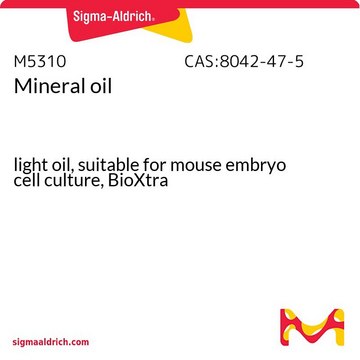5310-OP
HEPES
>= 99%, Free Acid, fine powder, OmniPur® Grade
Synonym(s):
HEPES, N-2-Hydroxyethylpiperazine-N′-2-ethanesulfonic acid, 4-(2-Hydroxyethyl)piperazine-1-ethanesulfonic acid, N-(2-Hydroxyethyl)piperazine-N′-(2-ethanesulfonic acid)
About This Item
Recommended Products
Product Name
HEPES, OmniPur® Grade, >= 99%, Free Acid
Quality Level
form
fine powder
manufacturer/tradename
Calbiochem®
storage condition
OK to freeze
color
white
useful pH range
6.8-8.2
pKa (25 °C)
7.5
shipped in
ambient
storage temp.
10-30°C
SMILES string
OCCN1CCN(CC1)CCS(O)(=O)=O
InChI
1S/C8H18N2O4S/c11-7-5-9-1-3-10(4-2-9)6-8-15(12,13)14/h11H,1-8H2,(H,12,13,14)
InChI key
JKMHFZQWWAIEOD-UHFFFAOYSA-N
Looking for similar products? Visit Product Comparison Guide
General description
Molecular Biology grade
A260 (0.1 M, water): ≤0.05 AU
A280 (0.1 M, water): ≤0.05 AU
Assay (dried basis): ≥99
DNase: None detected
Heavy metals (as Pb): ≤0.001%
Phosphatase: None detected
pKa at 25°C: 6.80-8.20
Protease: None detected
RNase: None detected
Intended for laboratory and manufacturing use only. Not for drug, food, or household use.
Application
<li><strong>Phenothiazine appended thiophene derivative: a trilateral approach to copper ion detection in living cells and aqueous samples.</strong>: This study explores the use of HEPES buffer in the detection of copper ions, showcasing its utility in maintaining the stability of the sensor in aqueous solutions and live cell environments. The findings indicate that HEPES buffer plays a crucial role in the accuracy and efficiency of ion detection assays, which is essential for biochemists working with metal ion sensors (Ilakiyalakshmi et al., 2024).</li>
<li><strong>Evaluation of acute intravenous toxicity of HEPES: Is Good′s buffer good and safe enough for clinical utilization in nuclear medicine </strong>: This research assesses the safety of HEPES buffer for intravenous use, specifically its acute toxicity. The results are vital for biochemists in nuclear medicine, indicating that HEPES is a safe and effective buffering agent for clinical applications (Guleria et al., 2024).</li>
<li><strong>Nanoscale engineering of gold nanostars for enhanced photoacoustic imaging.</strong>: The study highlights the use of HEPES buffer in the synthesis of gold nanostars, which significantly improves photoacoustic imaging. This demonstrates the buffer′s importance in nanobiotechnology, particularly in enhancing the stability and functionality of nanomaterials used in imaging techniques (Zhang et al., 2024).</li>
<li><strong>Influx of zwitterionic buffer after intracytoplasmic sperm injection (ICSI) membrane piercing alters the transcriptome of human oocytes.</strong>: This article discusses how HEPES buffer influences the transcriptome of human oocytes post-ICSI, highlighting its role in reproductive biology and assisted reproductive technologies. The findings are crucial for biochemists focusing on fertility treatments and genetic studies (Mendola et al., 2024).</li>
<li><strong>One Method to Label Them All": A Single Fully Automated Protocol for GMP-Compliant 68Ga Radiolabeling of PSMA-11, Transposable to PSMA-I and PSMA-617.</strong>: This paper outlines a protocol using HEPES buffer for radiolabeling in nuclear medicine, emphasizing its application in producing radiopharmaceuticals. The research supports the buffer′s critical role in maintaining the quality and compliance of radiolabeling processes (Fouillet et al., 2024).</li>
</ul>
Legal Information
Storage Class Code
13 - Non Combustible Solids
WGK
WGK 1
Flash Point(F)
Not applicable
Flash Point(C)
Not applicable
Certificates of Analysis (COA)
Search for Certificates of Analysis (COA) by entering the products Lot/Batch Number. Lot and Batch Numbers can be found on a product’s label following the words ‘Lot’ or ‘Batch’.
Already Own This Product?
Find documentation for the products that you have recently purchased in the Document Library.
Customers Also Viewed
Our team of scientists has experience in all areas of research including Life Science, Material Science, Chemical Synthesis, Chromatography, Analytical and many others.
Contact Technical Service


